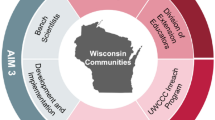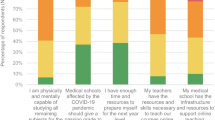Abstract
To gain input on a proposed culturally responsive, distance-delivered cancer education course informed by empowerment theory and adult-learning principles, Alaska’s Community Health Aides/Practitioners (CHA/Ps) and CHA/P leadership were invited to take an online survey in February 2015. The proposed course will be developed as part of the “Distance Education to Engage Alaskan Community Health Aides in Cancer Control” project. The results of the survey demonstrate that respondents are both interested in taking the proposed class and engaging in course development. The results also indicate that respondents have the technological comfort and capacity to be engaged in online learning and have primarily positive experiences and perceptions of distance education. This survey is the beginning of the interactive development of the online cancer education course and part of a continuing endeavor to promote wellness with, and for, Alaska’s people by empowering Alaska’s CHA/Ps and inspiring positive behavioral change to both prevent cancer and support those who feel its burdens.
Similar content being viewed by others
Notes
“Thank you very much” in Yupik, the language of the Yup’ik people of Alaska
References
Kelly J, Schade T, Starkey M, Ashokkumar R, and Lanier AP (2012) Cancer in Alaska Native People 1969–2008 40-Year Report. Anchorage: Alaska Native Tumor Registry, Alaska Native Epidemiology Center, Division of Community Health Services, Alaska Native Tribal Health Consortium
Alaska Native Epidemiology Center (2013) Statewide data: leading causes of death. Accessed online July 10, 2015 from: http://www.anthctoday.org/epicenter/assets/data/statewide/leading_causes_of_death_statewide_12_31_13.pdf
Alaska Department of Health and Social Services, Division of Public Health. Health risks in Alaska among adults: Alaska Behavioral Risk Factor Survey 2009 Annual Report. Juneau: Alaska Department of Health and Social Services, Division of Public Health. Accessed online July 10, 2015 from: http://dhss.alaska.gov/dph/Chronic/Documents/brfss/pubs/BRFSS09_FullReport.pdf
Centers for Disease Control and Prevention (CDC) (2008) Behavioral risk factor surveillance system survey data. Atlanta, Georgia: U.S. Department of Health and Human Services, Centers for Disease Control and Prevention. Accessed online July 10, 2015 from: http://apps.nccd.cdc.gov/brfss/index.asp
Alaska Department of Health and Social Services, Division of Public Health. Health risks in Alaska among adults: Alaska Behavioral Risk Factor Survey 2008 Annual Report. Juneau: Alaska Department of Health and Social Services, Division of Public Health. Accessed online July 10, 2015 from: http://dhss.alaska.gov/dph/Chronic/Documents/brfss/2008/BRFSS08.pdf
Seef LC, Nadel MR, Klabunde CN, Thompson T, Shapiro JS, Vernon SW, Coates RJ (2004) Patterns and predictors of colorectal cancer test use in the adult U.S. population. Cancer 100:2093–2103
Cueva M, Lanier A, Dignan M, Kuhnley R (2005) Cancer education for community health aides/practitioners in Alaska. J Cancer Educ 20(2):85–88
Kuhnley R, Cueva M (2011) Learning about cancer has brightened my light. Cancer education for Alaska community health aides and community health practitioners (CHA/Ps). J Cancer Educ 26(3):522–29
Perkins DD, Zimmerman MA (1995) Empowerment theory, research, and application. Am J Community Psychol 23(5):569–79
National Cancer Institute (2010) Trends in cancer information seeking. Health Information National Trends Survey. Brief 16. Accessed online July 10, 2015 from: http://hints.cancer.gov/docs/Briefs/HINTS_Brief_16.pdf
Acknowledgments
Research reported in this manuscript was supported by the National Cancer Institute of the National Institutes of Health under award number R25CA186882. The content is solely the responsibility of the authors and does not necessarily represent the official views of the National Institutes of Health.
Author information
Authors and Affiliations
Corresponding author
Rights and permissions
About this article
Cite this article
Cueva, K., Revels, L., Kuhnley, R. et al. Co-Creating a Culturally Responsive Distance Education Cancer Course with, and for, Alaska’s Community Health Workers: Motivations from a Survey of Key Stakeholders. J Canc Educ 32, 426–431 (2017). https://doi.org/10.1007/s13187-015-0961-6
Published:
Issue Date:
DOI: https://doi.org/10.1007/s13187-015-0961-6




